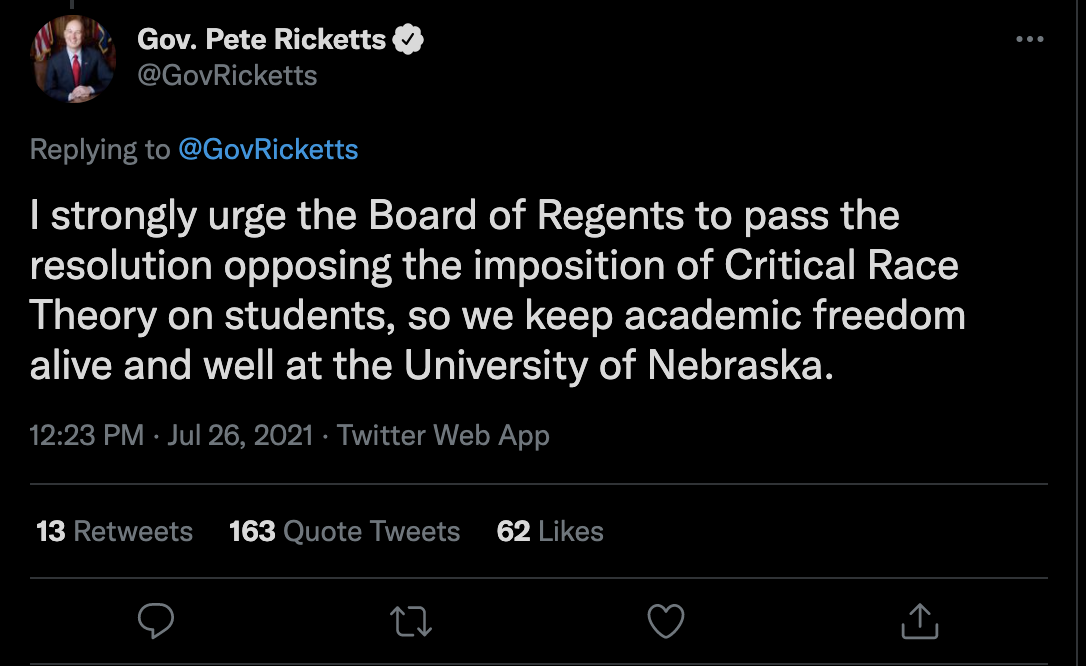
A critical race theory (CRT) clash is ensuing at the taxpayer-funded University of Nebraska, and it is another example of how those in power are grappling with the left-wing ideology’s injection into the classroom.
Republican gubernatorial candidate Jim Pillen, who is also a regent at the University of Nebraska, recently announced his plan to put forth a campus resolution opposing critical race theory in August, which led to the administration issuing a statement calling for “academic freedom” due to its “significant concerns about the resolution.”
“Regent Jim Pillen has notified us that he intends to place a resolution regarding critical race theory on the agenda for the August 13 Board of Regents meeting,” the university wrote in a July 21 email obtained by The Federalist to faculty, staff, and students. “As we have shared with Regent Pillen, we have significant concerns about the resolution and how it would be interpreted by the faculty, staff and students we hope to recruit and retain. We will continue to work together and with the Board to vigorously protect and defend academic freedom at the University of Nebraska.”
Without completely banning any mention of critical race theory in classrooms, Pillen’s resolution seeks to bar teachers from imposing it on their students. It states:
Whereas we oppose discrimination in any form and whereas critical race theory does not promote inclusive and honest dialogue and education on campus and whereas critical race theory proponents seek to silence opposing views and disparage important American ideals, be it resolved that the regents of the University of Nebraska oppose any imposition of critical race theory in curriculum.
The regent’s move comes after Chancellor Ronnie Green of the University of Nebraska-Lincoln wrote a column in January calling for “anti-racism” and “racial equity.” Likewise, the school said in July 2020 it would “begin a journey of addressing anti-racism and racial equity” and “Commit to studying and addressing systemic issues and institutional policies.”
Reacting to Pillen’s resolution, the University of Nebraska said in its press release, “Issues around race, equity and the fight against racism are an important part of our country’s story and they have an appropriate place in our classrooms,” affirming its prior commitment to potentially mandating anti-racism coursework. Such mandates are not uncommon these days in major institutions, given the University of Pittsburgh now requires all freshman students to study “anti-black racism,” and 150 law school deans demanded that the American Bar Association mandate anti-racism training.
Pillen said in an interview with The Federalist that while his resolution does not ban critical race theory from being taught in various classes, it does ban mandates and course requirements.
“My resolution does not ban critical race theory,” Pillen said. “The goal of it is to make sure that all students understand that they are to be a part of a free and fair exchange of ideas — as are faculty — to be able to represent the academic freedom on both sides of it. The goal is to make sure that every professor and every student understands that critical race theory is not to be taught as an imposition.”
On Monday, Republican Nebraska Gov. Pete Ricketts announced his support for Pillen’s resolution. The governor’s backing comes after the United College Athlete Advocates, a major nonprofit and advocacy group for college athletes, unveiled a petition, which has gathered thousands of signatures, opposing Pillen’s move.
“I strongly urge the Board of Regents to pass the resolution opposing the imposition of Critical Race Theory on students, so we can keep academic freedom alive and well at the University of Nebraska,” Ricketts tweeted.

In Nebraska, regents maintain “charge of the general government and budget of the university,” Pillen’s deputy campaign manager John Gage told The Federalist. They also decide who the president is. The University of Nebraska has eight members who serve six-year terms. Pillen was first elected in 2012.
While regents are a nonpartisan group, Gage noted it currently boils down to six Republicans and two Democrats at the university. The Republican’s campaign thinks there is a 50-50 chance it passes, though, and a source familiar with the situation indicated to The Federalist that Pillen is trying to sway the more moderate conservatives to join the initiative.
“This resolution opposes policies, standards, and graduation requirements that would compel students to study critical race theory or adopt a CRT framework in their chosen course of study,” Pillen told The Federalist. “If a student chooses to study CRT, this resolution won’t stop them from learning about it or professors from teaching it on an elective basis.”
Bob Phares, a Nebraska regent who is a former member of the president’s advisory council and was formerly mayor of North Platte, said the resolution “needs further discussion” when asked whether he supports banning the imposition of CRT. “I think there is a lot of misinformation floating around about what Jim was attempting to do and what he really wanted,” Phares said, not elaborating further.
Colby Young, a junior at the university, told The Federalist that while Pillen’s resolution is “a good start,” more could be done.
“Should it be banned? Yes. But that’s just my opinion,” Young said, noting that “open debate does not necessitate mandatory lessons” and that he worries his “teachers are thinking in a more radical way.”
A spokeswoman for the university declined to comment further on the resolution, as did other regents.
Below is the document announcing Pillen’s resolution proposal.
Anti-CRT Resolution Univers… by The Federalist









